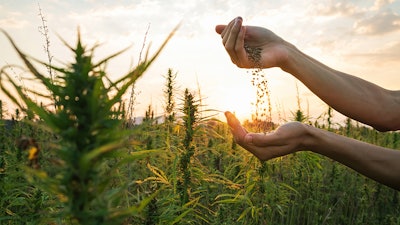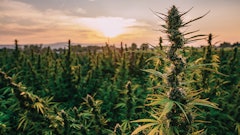
Major implications for the future of the U.S. hemp industry, including how cannabinoids like delta-8 and delta-9 THC are defined and regulated, hinge on specifics of the forthcoming 2023 Farm Bill.
But a key U.S. senator indicated Oct. 20 that this must-pass legislation might not meet an end-of-year deadline to replace the Agricultural Improvement Act of 2018 (2018 Farm Bill). The Farm Bill, which was first adopted in 1933 as part of the New Deal, is renewed roughly every five years with the current rendition only in force through the end of 2023.
Sen. John Boozman, R-Ark., who is the ranking member of the U.S. Senate Agriculture Committee that holds responsibility for guiding the legislation through the upper chamber, said he would like to consider a one-year extension on passing the bill, St. Louis Public Radio reported.
Should such an extension materialize, it wouldn’t prevent lawmakers from passing a bill sooner than the end of 2024, said Boozman, who joined U.S. Sen. Eric Schmitt, R-Mo., on Friday for a roundtable discussion with a delegation of Missouri farmers in Columbia about the Farm Bill.
“We want to get the Farm Bill done as soon as possible, hopefully before the end of [next] year,” Boozman said. “That doesn’t preclude us from getting it done [sooner]. But it gives us that time. And it gives the farmers the certainty that they will have a Farm Bill in place.”
Congress renews this legislation regularly to address the nation’s current agricultural and food policies through a variety of programs, including nutrition assistance like SNAP as well as myriad farm-related matters, from fertilizer and energy use to crop insurance, commodity support and conservation. The U.S has passed 18 farm bills since 1933, according to the Library of Congress.
And while industrial hemp provisions included in the 2018 Farm Bill legitimized the U.S. hemp industry through legalization and regulation beyond pilot programs, the 530-page bill extended well beyond hemp.
With this in mind, the consideration of a one-year extension to pass the legislation does not come as a surprise, said Jonathan Havens, partner and co-chair of Saul Ewing’s Cannabis Law and Food, Beverage, and Agribusiness practices, whose background includes working as a legislative aide in the U.S. House and Senate, before beginning his legal career as a counsel at the U.S. Food and Drug Administration (FDA).
“For anybody who’s not read it before or has not read anything but the hemp-related provisions, it’s a behemoth,” Havens said of the Farm Bill. “It’s a big bill, and it deals with a lot of things and—with no denigration to the industry that I spent a lot of time in—it’s but a small part of the overall legislation.”
Should Jan. 1, 2024, come without passages of a 2023 Farm Bill and without an extension, the U.S. farm economy would turn “chaotic,” U.S. Department of Agriculture Secretary Tom Vilsack said Oct. 16 during a farm visit in rural Illinois, FarmWeek Now reported. Notably, some programs would automatically revert back to certain provisions set forth in 1938, he said.
In a nutshell, the Farm Bill has significant bearing on what is grown and how it is grown, and that now includes hemp. And with just more than two months remaining in 2023, Havens said he doesn’t see a new Farm Bill being passed before the end of the year.
“Many stakeholders … have been looking at the lack of momentum on this year’s iteration with our bill and saying, ‘Why haven’t we seen a draft? Why hasn’t this moved? What's the timeline? Is this even possible now?’” he said. “The last Farm Bill was signed in December of 2018, but it had been negotiated and circulated in draft form far before that.”
Compounding the tight 2023 deadline, the U.S. House has been unable to conduct business without a House speaker for the past three weeks. Additionally, lawmakers face a more urgent deadline of funding the federal government to prevent a shutdown (currently, a stopgap bill passed Sept. 30 only funds the government through Nov. 17).
Amid this chaos in the Capitol, an extension to pass the 2023 Farm Bill is a “reasonable” proposal by Boozman, Havens said.
“When you get a must-pass piece of legislation like this, it becomes known as a Christmas tree bill. Everybody tries to shove something under the tree, the present so to speak, because let’s attach whatever we can to the Farm Bill because it’s must-pass,” Havens said. “So, even if we can get to a spot where we have enough time to debate it and to pass it, which I’m starting to doubt that we will, you wonder what other things are going to be attached, and do those things make it unpassable—to get consensus from Congress?”
As the likelihood of passing a 2023 Farm Bill before the end of the year continues to fade each day, Boozman proposed adding an extension for the bill as an attachment to forthcoming legislation responsible for funding the government beyond Nov. 17, according to St. Louis Public Radio.
Given the current makeup of Congress with thin margins of majority rule, Havens said he believes lawmakers will have to deal with multiple extensions on unfinished business before the end of the year.
“I don’t think anybody wants the agriculture, agribusiness, farming communities to be harmed by Washington’s inability to get something done,” he said. “It’s better to carry something forward than to have nothing at all. So, I’m not worried about not getting an agreement on an extension.”
For the Farm Bill, specifically, it wouldn’t be the first time Congress extended passage beyond the legislation’s intended renewal. The 2014 Farm Bill, for example, was signed into law in February that year after it was supposed to be authorized in 2012.
As far as potential implications to the U.S. hemp industry should the 2023 Farm Bill’s passage get extended, Havens said industry stakeholders will simply have to wait longer for their concerns with the 2018 version to be addressed.
“There are some challenges that farmers and processors have, and also, many are saying, ‘Well, because of the provision in the last Farm Bill that prevented hemp-derived cannabinoids from being put into ingestible products—this is FDA’s position and the bill preserved FDA’s authority—would this 2023 Farm Bill address that?’” Havens said.
“My personal philosophy has been ‘no’; this is an ag bill, not a finished products bill,” he said. “But because FDA punted back to Congress on this CBD issue, many had wondered, ‘Would Congress use a must-pass bill like the Farm Bill to go outside of the ag lane, so to speak, to address the full life cycle of the hemp plant from soil to oil?’”
While hemp was legalized in the U.S. under the current 2018 Farm Bill, which offers regulatory guidance as it relates to industrial hemp grown for fiber, grain and seed, it left certain gaps with regard to regulating floral “cannabinoid hemp” and its derivatives—such as CBD and delta-8 THC.
Following the passage of the 2018 Farm Bill, hemp-derived intoxicating cannabinoid products began entering the U.S. marketplace under what some call a loophole in the legislation.
Specifically, the 2018 Farm Bill defines hemp via a 0.3% delta-9 THC threshold on a dry-weight basis. But this “dry-weight basis” paved way for intoxicating edible products (i.e., a 100-gram chocolate bar could contain 300 milligrams of THC and remain compliant with the 0.3% threshold). For many consumers, it takes 10 milligrams of THC or fewer to begin experiencing the psychoactive effects of the plant.
In addition, the 2018 Farm Bill fails to define intoxicating cannabinoid derivatives like delta-8 THC, THC-O acetates and hexahydrocannabinol (HHC), which can be chemically converted from CBD-rich hemp plants.
For these reasons, and others, organizations like the Cannabis Regulators Association (CANNRA), a nonpartisan association of government officials representing cannabis and hemp regulatory agencies from 45 member states and U.S. territories, are urging lawmakers like Boozman to include changes in the 2023 Farm Bill that would define hemp-derived cannabinoid products in a manner that helps regulate the sale of intoxicating products.
And despite many state governments arguing that the intent of the 2018 Farm Bill was never to allow intoxicating derivatives like delta-8 THC to be allowed in the marketplace to begin with, some companies that manufacture products that include these derivatives have won court injunctions allowing them to continue selling these products to consumers as a pathway to profitability.
In Texas alone, for example, $3.3 billion of revenue came from CBD and converted cannabinoid retail sales in 2022, according to a Whitney Economics report.
“There’s been some questions, frankly, on both sides of the issue from people that don’t like those products and that do like those products,” Havens said about delta-8 THC and other intoxicating hemp-derived products.
“And you’ve seen some of the state regulatory bodies out there saying this needs to be clarified. It’s not clear,” he said. “I mean, look, industry can move a lot quicker than Washington can. That’s always been the case. But it would be good if there was more clarity from Congress on a lot of these issues. And, unfortunately, until you have a debated and negotiated Farm Bill, it’s just going to carry forward and that 0.3% threshold will continue.”
























